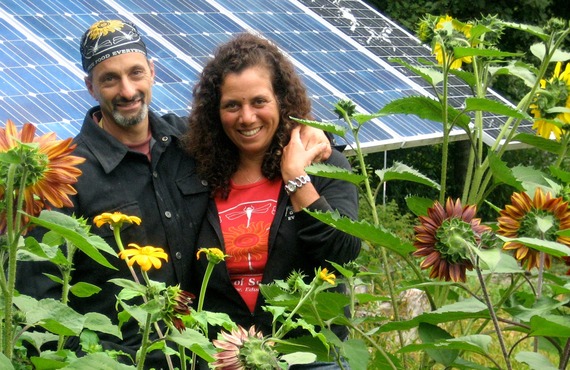Farmers and educators Deb Habib and Ricky Baruc explain how blending farming with social and environmental justice gives them a way to express their passion for solidarity with nature and humanity.
Omega: Farming can be challenging, and farming with social and environmental justice as goals seems like it could be an even bigger undertaking. What motivates you to keep at it each day?
Deb & Ricky: When visitors arrive at our farm they see sculpture, altars, and signs woven among the fields and greenhouses, with quotes from passionate drivers for justice who have gone before us and are our inspiration, like Nelson Mandela, Vandana Shiva, Thich Nhat Hanh, Angela Davis, and Hopi Elders. Social and environmental justice is at our core, and are core values behind all we do.
There is much to be angry about and fearful of, but these are not healthy motivating forces, as they will eat you up and wear you down over time. Our relationship, and pursuing creative ideas, provide motivation and balance as we keep each other buoyant and remember why we do what we do. Love must drive one's work and is also the greatest sustaining force and message to convey.
Omega: What is each of your favorite and least favorite farm chores?
Deb & Ricky: Ricky farms by hand and has hauled thousands of wheelbarrows of compost to his farm fields for the last 30 years. While some would find this a chore, he loves the physical sensation and feeding the life in the soil with vital nutrients. In addition, he's a land artist--creating beauty in each row and bed is a joy for him.
Our least favorite thing is not really a chore, but an aspect of farming that can be a great challenge--we farm in connection with nature, and sometimes there is too much of it! Critters like porcupines and others may come and devastate a beautiful crop just before harvest. We catch and relocate them to a distant spot, but this process can result in many sleepless nights of stress.
Omega: In the mid-1990s you spent eight months on a peace pilgrimage from Auschwitz to Hiroshima. How did it change your life?
Deb & Ricky: Our first market garden together in the mid 1980s had a sign that read: "This food is grown in solidarity with those around the world helping to feed the people." We came up with the name Seeds of Solidarity for our farm and nonprofit-to-be just before we left on the pilgrimage in 1994. On the pilgrimage we joined with an international, interfaith group walking, chanting, and praying in solidarity with those around the world maintaining their humanity, humility, and resilience amidst the suffering of war.
This opened our hearts and emotional pathways in ways that continue daily, often with tears. While in Iraq on the pilgrimage, we saw firsthand the devastation caused by wars over oil. This strengthened our resolve to reduce our reliance on fossil fuels and use renewable energy. We have used solar power for all of our home and farm electricity since, and farm without machinery.
Omega: Is there an overarching principle that guides you in your life?
Deb & Ricky: Love and gratitude.
Explore more in the category of Sustainable Living.
© 2016 Omega Institute for Holistic Studies, Inc. All rights reserved.

